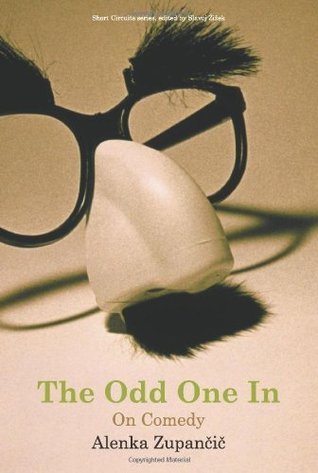What do you think?
Rate this book


Why philosophize about comedy? What is the use of investigating the comical from
philosophical and psychoanalytic perspectives? In The Odd One In, Alenka Zupancic [haceks over both
cs] considers how philosophy and psychoanalysis can help us understand the movement and the logic
involved in the practice of comedy, and how comedy can help philosophy and psychoanalysis recognize
some of the crucial mechanisms and vicissitudes of what is called humanity. Comedy by its nature is
difficult to pin down with concepts and definitions, but as artistic form and social practice comedy
is a mode of tarrying with a foreign object--of including the exception. Philosophy's relationship
to comedy, Zupancic [haceks over both cs] writes, is not exactly a simple story (and indeed includes
some elements of comedy). It could begin with the lost book of Aristotle's Poetics, which discussed
comedy and laughter (and was made famous by Umberto Eco's The Name of the Rose). But Zupancic
[haceks over both cs] draws on a whole range of philosophers and exemplars of comedy, from
Aristophanes, Molière, Hegel, Freud, and Lacan to George W. Bush and Borat. She distinguishes
incisively between comedy and ideologically imposed, "naturalized" cheerfulness. Real,
subversive comedy thrives on the short circuits that establish an immediate connection between
heterogeneous orders. Zupancic [haceks over both cs] examines the mechanisms and processes by which
comedy lets the odd one in. Alenka Zupancic [haceks over both cs] is Senior Research Fellow at the
Institute of Philosophy, Slovene Academy of Sciences, Ljubljana. She is the author of The Shortest
Shadow: Nietzsche's Philosophy of the Two (MIT Press, 2003).
240 pages, Kindle Edition
First published February 8, 2008